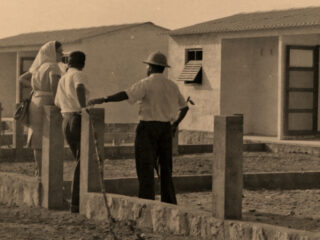ArchLabour – Architecture, Colonialism and Labour. The role and legacy of mass labour in the design, planning and construction of Public Works in former African territories under Portuguese colonial rule
The discipline of architecture, when dealing with Public Works associated with colonialism and territorial occupation, still focuses on the analysis of the constitution of the design teams, of the colonial Public Works offices, of the architects and engineers themselves.
This focus on the “designing elite” misses a critical input to these Public Works, namely the Labour force responsible for realising these structures. As such, critical questions about the labour force engaged in the spatialization of architectural plans are still missing: who were those workers? What ethnic groups did they come from? How did they emerge in contingents that could aggregate a few thousand individuals? What was their recruitment like? What expectations did they have? How were they paid? What training did they receive? What repercussions did these (mostly compulsive) work experiences have?
What conflicts did they provoke in colonial societies? How did they resist recruitment? How did they collaborate? How to deal with this legacy? In answer, ArchLabour will develop a new theoretical framework for assessing mass labour in order to shine a spotlight on these invisible workers, thus establishing a connection between historical subalternity and the inequality that still haunts communities inheriting this past.
Through the study of the diverse colonial experiences of the African countries that have Portuguese as one of their official languages (Cape Verde, Guinea-Bissau, São Tomé and Principe, Angola and Mozambique), and covering a wide period from the modern colonization that begins after the Berlin Conference through the industrial capitalism’s exploitation praxis up to the years immediately following African independence, the project will cross the history of colonial architecture and the subject of Labour, with the history of Science applied to construction and post-colonial studies in architecture.
ISCTE-IUL
over the Movene river
1942 [PT/AHU/ID-OP/OP01381]
Team
Results
CONFERENCES PARTICIPATION
Milheiro, Ana Vaz; Serrazina, Beatriz (2024).Building from colonial nonsimultaneities: Mabubas Dam, Angola. [Communication presented]. Society of Architectural Historians (SAH) 2024 Annual International Conference, Albuquerque, New Mexico, April 17–21.











